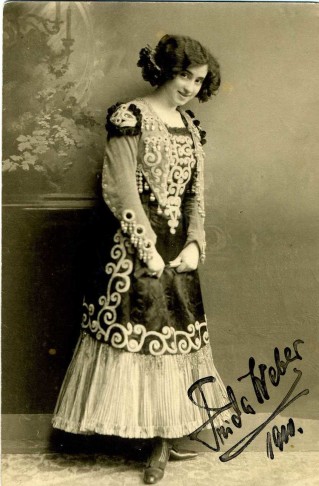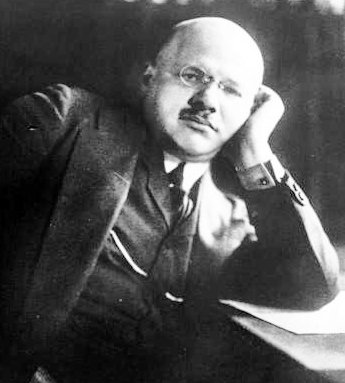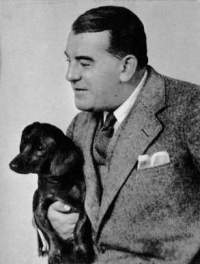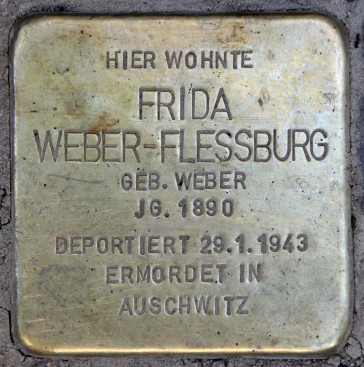Kevin Clarke
Operetta Research Center
4 April, 2015
No, Frida Weber-Flessburg (1890-1943) is not one of those fabled operetta divas whose career the Nazis destroyed, but whose memory lives on in famous unsurpassed recordings. That is not to say that this coloratura soprano from Krakow didn’t make many recordings of hit songs during her Berlin years, but still she was completely forgotten after being deported to Auschwitz. Thanks to the initiative of the Frida Leider Gesellschaft there now is a disc with some of Weber-Flessburg’s greatest moments – which include three of the best Leo Fall recordings ever made!

The young Frida Weber-Flessburg as seen on an autograph card.
It’s a distinct voice, typical of the 1920s: there is a slight nervous shiver in the timbre, a girlish innocence mixed with a hint of cheekiness. As a coloratura soprano, Frida Weber-Flessburg does not possess the vocal glamour of a Gitta Alpar; her top notes do not have the dazzling knock-out effect of her Hungarian colleague. Rather, there is a certain Fritzi Massary quality to her sound, but not to her style. Which might explain why in the late 1920s – when there were so many superlatively good performers around – Weber-Flessburg did not step into the front row of stars. But she did record extensively, and moved with ease between opera, operetta and Schlager.
The album Frida Weber-Flessburg: OperOperetteLiedSchlager starts out with “Quando m’en vo’ soletta per la via” from Bohéme, offers Mignon’s “Connais-tu le pays” as “Kennst du das Land,” and Martha’s “Last Rose of Summer,” before moving onto operetta territory. The first song here is – of course – “Vilja.” It doesn’t show off the voice at its best, because Weber-Flessburg sings this number in a rather detached manner, like a plain and simple folk song. Which it is supposed to be, of course; but it has been recorded by many others in much more spectacular versions. You get a better idea of what she is capable of with the next track, “Warum hast du mich wach geküsst?” from Lehár’s Friederike. Again, Weber-Flessburg starts out with a simple, folksong approach.
But when she moves into the middle section of this number, her voice opens up, and she adds vocal power to her emotional outburst.
Suddenly they are there, those ringing top notes and the ability to emphasize words, give meaning to them. Here, as elsewhere, Weber-Flessburg’s diction is exemplary. And she has no problems adapting to the particular style of operetta, an ability later lost by most opera singers crossing borders.
In the midst of the large Lied section on this disc (Grieg, Reger, Taubert), the true glories start. Take, for example, the “Baby-Lied” by Walter Jurmann from the movie Melodie der Liebe. Or “Ma Curly Headed Babby” by George H. Clutsan, recored in 1932 and 28 respectively. They lie much lower in Weber-Flessburg’s voice, and she finds richer colorings there, a more spontaneous handling of the text. The same is true for “Chérie, I Love You” by Lillian Rosedale Goodman. A special treat – as a rarity – is her interpretation of “Ich bin von Kopf bis Fuß auf Liebe eingestellt” and “Ich bin die fesche Lola,” from The Blue Angel. It’s impossible to replace the Marlene Dietrich versions of these Friedrich Holländer songs, but Weber-Flessburg gives them a decidedly different and unique new interpretation that is fun to know.

Composer Leo Fall in 1915.
And then come the true gems of this disc: three duets from Leo Falls Der liebe Augustin, recorded in 1929. In the first, “Anna, was ist denn mit dir?”, Weber-Flessburg is teamed up with her husband, tenor Alexander Flessburg. He has a much more “natural” sound, which works well with her more focused and stylized opera voice. He prompts her to act on the sound stage. It’s a super lively, super bubbly, and superb version of this duet. I must confess that I know no other recording of the Liebe Augustin music that comes close to this is terms of temperament. This is also true for “Und der Himmel hängt voller Geigen” and “Wo steht denn das geschrieben.” In both of these, Weber-Flessburg partners up with tenor Max Kuttner. Again, it’s Leo Fall singing of the highest order. I wish there’d be a complete recording of this show with these artists.
Compared the recent Leo Fall revival attempts you wonder why modern-day singers have such problems getting the style right, when it sounds so easy with Weber-Flessburg & Co.

The comedian and operetta singer Alexander Flessburg.
There is another duet with Alexander Flessburg on this disc: “Du must heiraten!” – an “amusing modern Schlager parody” written by Mr. Flessburg with Eli P. Samson and recorded in the summer of 1932. The couple is in great form here, too. And full of joie de vivre. But life was about to take a very unjoyful turn for the two singers in 1933. Because of her Jewish background, Frida Weber-Flessburg lost her right to appear on German stages (“Auftrittsverbot”), her name was listed in the infamous Lexikon der Juden in der Musik. Her marriage with Alexander Flessburg fell apart. Their daughter Ruth escaped to Switzerland; Alexander Flessburg died in 1942 at the age of 59. Frida had to work in an ammunition factory once Word War II broke out. On the night of 18 January 1943 she was picked up by the Gestapo at her apartment in Hektorstraße 3, Berlin. She spent ten days in a ghetto on Großen Hamburger Straße before she was taken – together with 1.004 others – to Auschwitz. She was killed there upon arrival and erased from operetta history.

The “Stolperstein” for Frida Weber-Flessburg on Hektorstraße 3, Berlin. (Photo: Wikipedia)
It took until 2012 until she got a so called “Stolperstein” in front of her former house in Berlin, to remind the world of her. And she now has a disc to her name that preserves the memory of her voice. As I said, she does not possess the vocal glam factor of Gitta Alpar; but her Leo Fall recordings are one-of-a-kind, a must-have for any operetta fan. And her various popular song outings – which also include “Du kannst so liebesnwürdig sein” and “Ich möcht’ heiraten” by Michael Krausz – are great fun to hear. Actually, the parody of that last song, “Du must heiraten”, recorded with her husband, is another one of those moments you are not likely to forget soon. There is a wit and intimacy, cheek and drive to these interpretations that you rarely find today.
All tracks on this disc, issued by Peter Sommeregger and the Frida Leider Gesellschaft, have been masterfully restored by Christian Zwarg: 24 numbers altogether. The source material comes from the Deutsche Nationalbibliothek – Deutsches Musikarchiv, from Michael E. Gunrem and Michael Seil, Peter Sommeregger and Christian Zwarg.
The disc can be ordered directly from the website of the Frida Leider Gesellschaft here. If you want to order the disc within the USA, then you can do so via Norbeck, Peters & Ford. (You should check the price difference.)

The song Ich möcht Heiraten ! (not Ich muss heiraten) was sung with Max Mensing, not her husband. A member of Alexander Flessburg’s family told me that Alexander had an affair, this may have resulted in their estrangement. Frida won the Gustav Hollaender Medal for her singing in 1911.